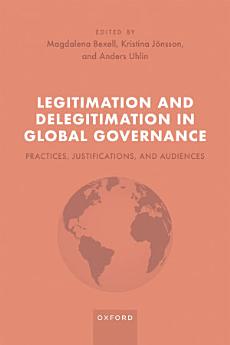Legitimation and Delegitimation in Global Governance: Practices, Justifications, and Audiences
Magdalena Bexell · Kristina Jönsson · Anders Uhlin
Nob 2022 · Oxford University Press
E-book
256
Mga Page
family_home
Kwalipikado
info
reportHindi na-verify ang mga rating at review Matuto Pa
Tungkol sa ebook na ito
This is an open access title available under the terms of a CC BY-NC-ND 4.0 International licence. It is free to read at Oxford Scholarship Online and offered as a free PDF download from OUP and selected open access locations. The legitimacy of global governance institutions is both contested and defended in contemporary global politics. Legitimation and Delegitimation in Global Governance explores processes of legitimation and delegitimation of such institutions. How, why, and with what impact on audiences, are global governance institutions legitimated and delegitimated? The book develops a comprehensive theoretical framework for studying processes of (de)legitimation in governance beyond the state. It provides broad comparative analyses to uncover previously unexplored patterns of (de)legitimation processes. A diverse set of global and regional governmental and nongovernmental institutions in different policy fields are included. Variation across these institutions is explained with reference to institutional set-up, policy field characteristics, and broader social structures, as well as to the qualities of agents of (de)legitimation. The approach builds on a mixed-methods research design that uses quantitative and qualitative new empirical data. Three main interlinked elements of processes of legitimation and delegitimation are at the center of the analysis: the varied practices employed by different agents that may boost or challenge the legitimacy of institutions; the normative justifications that these agents draw on when engaging in legitimation and delegitimation practices; and the different audiences that may be impacted by legitimation and delegitimation. This results in a dynamic interplay between legitimation and delegitimation in contestation over the legitimacy of GGIs.
Tungkol sa may-akda
Magdalena Bexell is Associate Professor at the Department of Political Science, Lund University, Sweden. Her main fields of research are international relations, global governance, sustainable development politics, and human rights. Recent research projects concern legitimacy in global governance with a focus on the politics of legitimation and delegitimation. Another strand of her current research explores governance processes at the global-national nexus related to the United Nations 2030 Agenda for sustainable development. Kristina Jönsson is Associate Professor at the Department of Political Science, Lund University, Sweden. Her research concerns international cooperation in the broad field of development focusing on governance issues, policy processes, and global-local linkages. Current research deal with legitimacy and responsibility in global governance, with a special focus on the United Nations' Sustainable Development Goals and global health. Her previous work concentrated on politics and policy-making in South-East Asia. Anders Uhlin is Professor at the Department of Political Science, Lund University, Sweden. His research focuses on civil society activism and processes of legitimation and delegitimation in global and regional governance, with a particular focus on Southeast Asia. Another strand of current research concerns the development of civil society elites in Cambodia and Indonesia as well as in Europe. He has previously explored civil society and problems of democratization in Indonesia and the post-Soviet context.
I-rate ang e-book na ito
Ipalaam sa amin ang iyong opinyon.
Impormasyon sa pagbabasa
Mga smartphone at tablet
I-install ang Google Play Books app para sa Android at iPad/iPhone. Awtomatiko itong nagsi-sync sa account mo at nagbibigay-daan sa iyong magbasa online o offline nasaan ka man.
Mga laptop at computer
Maaari kang makinig sa mga audiobook na binili sa Google Play gamit ang web browser ng iyong computer.
Mga eReader at iba pang mga device
Para magbasa tungkol sa mga e-ink device gaya ng mga Kobo eReader, kakailanganin mong mag-download ng file at ilipat ito sa iyong device. Sundin ang mga detalyadong tagubilin sa Help Center para mailipat ang mga file sa mga sinusuportahang eReader.








